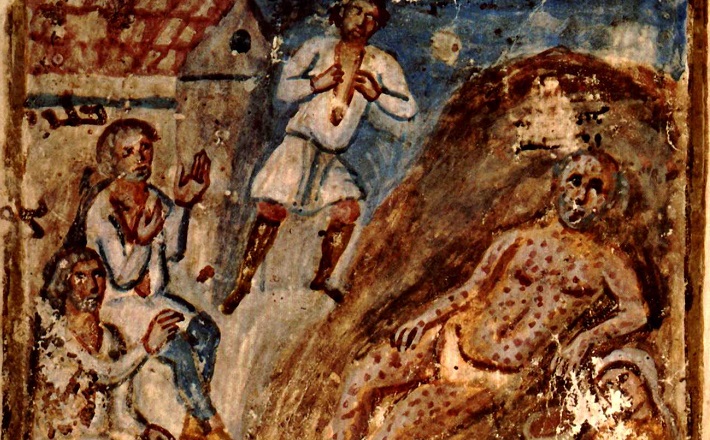Commentary on Mark 10:2-16
This day’s lesson actually consists of two pericopes.
One deals with divorce, the other with the blessing of little children. I suspect that the Revised Common Lectionary committee decided to put them together to help out the preacher who did not want to deal with the challenging divorce text. It is so much more pleasant to talk about little children.
Still, divorce was a significant and disputed issue in Jesus’ time, and doubtless there will be divorced persons in the pews who will pay special attention to this reading today. Divorce is not an easy sermon topic, and it was a complicated matter in the first century. There were differing perspectives between Jews and Romans and also within Judaism. Even within the New Testament there is not complete unanimity.
Here’s what you need to know. In general:
- The ancient world was patriarchal, and wives were regarded as the property of their husbands. Among Jews, technically only the husband could divorce his wife. (This is the working assumption in Mark 10:2-9.) In Roman society, a wife could divorce her husband. (This possibility is included in the follow-up in 10:10-12.)
- Marriages were not based on love between two persons but on property, status, and honor considerations between two families. Divorce, therefore, could be complicated. A whole tractate of the Mishnah (the rabbinic collection of Jewish oral law) is devoted to the topic.
- Jews regarded Romans and other non-Jews as having weaker standards regarding marriage, marital fidelity, and divorce. The Herodian dynasty, however, provides an example of how strings of marriage and divorce could be used to manipulate political and status advantages even within Jewish circles.
- The main biblical text for Jewish positions on divorce is Deuteronomy 24:1-4. This is the text referred to in Mark 10:4 when the Pharisees note that Moses allowed a husband to divorce his wife. The Deuteronomy text, however, is most concerned that a woman not remarry her first husband after she has been married to a second man.
So why is the question posed by the Pharisees to Jesus regarding divorce a “test”? (10:2) Since Moses stated a “commandment” regarding divorce, there really wasn’t a question whether it was lawful or not. The real issue is what constituted appropriate grounds for divorce. The parallel passage in Matthew 19:3 poses the matter more precisely. “Is it lawful for a man to divorce his wife for any cause?” It is the “for any cause” that was the problem, and it is related to a difficult phrase in the Hebrew of Deuteronomy 24:1 which speaks of the husband finding “something objectionable” (NRSV) in his wife. What does that mean? Is divorce permitted if the wife ruins the meal? (So said the ‘liberal’ school based on the teachings of the Rabbi Hillel.) Or does it entail a serious matter of immorality? (So said the ‘conservative’ school based on a contemporary rival of Hillel, Rabbi Shammai.) In Matthew, Jesus adopts the Shammai view, and this seems like such a daunting restriction to the disciples as to make them wonder whether one should marry at all (Matthew 19:10).
Here in Mark’s gospel, however, Jesus expresses an even more restrictive view. Divorce is simply a symptom of human failure that is contrary to God’s intentions in creation, so, Jesus says, “What God joined together, let no human separate.” Is this a blanket prohibition against divorce? What about the abusive or destructive relationships of which we are painfully aware? Should a corollary to Jesus’ pronouncement be just as true: What humans wrongly joined together, let God rightly separate?
As we should expect, God’s commands are not arbitrary but have a principle that motivates them. In a patriarchal Jewish society where only husbands had the prerogative of divorcing their wives, a prohibition of divorce provided a safeguard for women who could be left seriously disadvantaged after a divorce. Further, as Jesus spells out to the disciples in 10:10-12, in situations where either party could initiate a divorce, it’s the faithful partner that is harmed when his or her spouse divorces in order to marry someone else. Committing adultery is not an abstract, moral sin. It is a real, hurtful action against one’s God-joined partner.
This concern for those who are vulnerable carries over into verses 13-16 regarding the children brought to Jesus. We should first note that this section actually has a narrative function in connection to Mark 9:33-37. There the disciples had argued about who was the greatest, and Jesus asserted that “whoever wants to be first must be last of all and servant of all.” By way of example, Jesus took a child in his arms and said, “Whoever welcomes one such child in my name welcomes me, and whoever welcomes me welcomes not me but the one who sent me.” (9:37) When parents bring their children to Jesus a mere 25 verses later, the attentive reader knows that the proper response is indeed to welcome them. When the disciples, however, scold them, the reader can naturally become indignant, and when we are then told that Jesus became indignant (10:14), we discover that we have been guided into the proper, Jesus-like response of a true disciple.
The second thing to note, I would argue, is that experiencing the dominion of God is like welcoming a child, not becoming like a child. The NRSV renders verse 15 as: “Whoever does not receive the kingdom of God as a little child (paidion) will never enter it.” That paidion can be understood in two ways in the Greek. As a nominative case noun, it would mean, “Welcome the kingdom like a child welcomes it.” As such, this saying has often generated sentimental reflections on the importance of a simple, child-like faith. Really? In my experience, children are much better with “Why?” and “No!” than they are with quiet assent. If paidion is understood as an accusative case noun, however, then it means, “Welcome the kingdom like you would welcome a child.” This latter reading certainly fits the immediate context better, and it serves as a clear reiteration of what Jesus said in 9:37.
Why is this significant? In the culture of Jesus’ time where honor and shame were decisive factors in determining behavior, people would be very eager to welcome someone of high status whose company could increase one’s own honor. Children, however, were of very low status. There was no perceptible value in hosting a banquet for a child. (Birthday parties for children are a quite modern invention.) So when Jesus says that the reception of God’s dominion is like embracing a child, he is asserting again that God is not experienced in power but in weakness. Entering God’s dominion is not a way to become first or great but a way to identify with the least and to serve simply for Jesus’ sake.
For a selfish and self-centered person, it makes no sense to welcome children or remain faithful in a relationship when temptation beckons. From the very beginning, however, God has embraced us and remained faithful, and that’s good news.


October 4, 2015